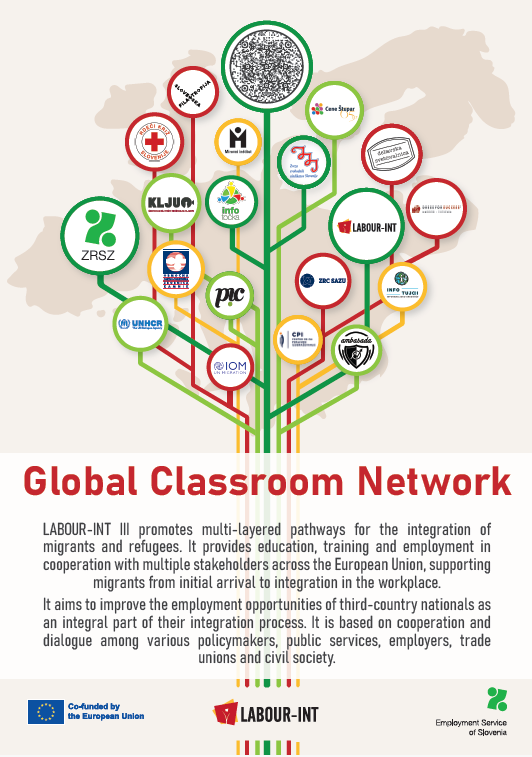LABOUR-INT III Project
The project, which is financed by the Directorate-General for Migration and Home Affairs (DG HOME) and led by SGI Europe, is based on the previous LABOUR-INT I and LABOUR-INT II projects. It is being carried out over a three-year period in cooperation with social and economic partners at the international, European and national levels (employers, trade unions, public employment agencies, chambers, business and NGOs).
Purpose of the project
LABOUR-INT 3: Multi-stakeholder initiative for migrant integration into the labour market promotes the multi-layered and multi-stakeholder inclusion of migrants and refugees throughout the European Union, from their arrival on the labour market, through education and training and on to employment.
It is an attempt to improve the job opportunities of third-country nationals as an integral part of their integration process. It is based on cooperation, commitment and dialogue with economic and social partners.
The project will also analyse national practices in Europe in the admission of foreign nationals, services, skills-matching and decent working conditions.

Global Classroom
The establishment of a national Global Classroom network also contributes to the project's objectives, supporting the successful integration of migrants into the labour market in Slovenia.
Goal of the project
To directly improve the integration of migrants and refugees into the labour market with the help of pilot measures and an increase in capacities of stakeholders on the labour market.
Target groups
The project is aimed at:
- policymakers,
- public services,
- employers and
- trade unions.
Within the project, activities will be carried out to strengthen capacities and disseminate information to make it easier for those stakeholders to integrate migrants and refugees into the labour market.
Key activities
- To foster the further introduction of the multi-stakeholder approach in countries and regions that have only just started to employ it: Bulgaria, Italy, Poland and Slovenia.
- Focus on three topical areas:
- provision of admission services;
- effectiveness of the processes of matching skills with demand;
- provision of decent jobs and working conditions.
- Steering migrants through the process of integration into the labour market.
- Providing support to migrants and refugees, such as orientation, language instruction and skills development.
- Strengthening the capacities and network of local employers, public employment services, trade unions and other interested parties.
Partnership
Project leader:
- SGI EUROPE, Belgium.
Other partners:
- Confédération Européenne des Syndicats Indépendants (ETUC), Belgium
- Lietuvos profesinių sąjungų Konfederacija (LPSK), Lithuania,
- Fondazione Archivio Storico e Centro Studi Rita Maierotti, Italy
- Smile Puglia (SMILE PUGLIA), Italy
- Employment Service of Slovenia (ZRSZ)
- Zveza svobodnih sindikatov Slovenije (Association of Free Trade Unions of Slovenia, ZSSS)
- Ogólnopolskie Porozumienie Związków Zawodowych (OPZZ), Poland
- Sdruzhenie Konfederacija na nezavisimite sindikati v Bulgarija (CITUB), Bulgaria
- European Association of Craft, Small and Medium-Sized Enterprises (SME UNITED/SMEU), Belgium
- Association of European Chambers of Commerce and Industry (EUROCHAMBRES), Belgium
- Caritas Sofia Sdruzhenie (CARITAS SOFIA), Bulgaria
21 associated partners from:
Belgium, France, Greece, Italy, North Macedonia, Germany, Romania, Serbia, Switzerland, Turkey and Ukraine.
Duration of project
From 1 April 2024 to 31 March 2027.
Funding
The value of the project is EUR 1,972,202.60, with the share for the Employment Service of Slovenia (ESS) amounting to EUR 124,687.10.
The project is co-financed 90% from the funds of the European Union – Directorate-General for Migration and Home Affairs (DG HOME), Asylum, Migration and Integration Fund (AMIF), and 10% from the funds of the Employment Service of Slovenia.
More information ...
Consult the project leader’s website: SGI Europe.


Thanks for your feedback. It will help us improve our website. Please do not enter any personal data such as your name, surname or e-mail address.